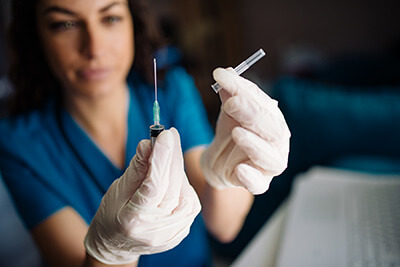 A recently published study found that some people with rosacea may be at risk of a flare-up or worsened signs and symptoms as a result of being infected by COVID-19 — and to a lesser degree from the protective vaccine as well.
A recently published study found that some people with rosacea may be at risk of a flare-up or worsened signs and symptoms as a result of being infected by COVID-19 — and to a lesser degree from the protective vaccine as well.
The study, conducted by researchers at the Skin Disease Hospital of Tongji University School of Medicine in Shanghai, China, enrolled 104 subjects whose rosacea diagnosis was confirmed by a dermatologist and who had either experienced a COVID-19 infection, received at least one COVID-19 vaccination, or both. The subjects completed a questionnaire providing demographic information, the rosacea phenotypes they experience, the frequency and duration of rosacea flare-ups, and health information such as body mass index (BMI) and other skin or systemic conditions they suffered. They were also asked whether they experienced a rosacea flare-up or any new signs or symptoms after a COVID-19 infection or vaccination, as well as whether they wore a mask and if so, for how long and whether they experienced a flare-up as a result.
Of the 104 subjects, 30 (28.8%) experienced a flare-up after a COVID-19 infection and 16 (15.4%) reported experiencing one after a vaccination against COVID-19. In their analysis of the results, the investigators found some interesting connections.
Patients who had a flare-up after vaccination were more likely to flare up again following a subsequent infection. In addition, vaccination-related adverse reactions were reported more frequently in those who experienced flare-ups. The investigators wrote that the findings suggested that viral-induced disruption of the immune system may contribute to the onset of rosacea, and said further research was warranted.
Lower BMI was significantly associated with an increased risk of an exacerbation of rosacea signs and symptoms in both those who contracted COVID-19 and those who were vaccinated.
Patients who had comorbidities such as metabolic diseases (such as diabetes) or allergies, as well as those who experienced burning or stinging sensations, were more likely to flare up after getting vaccinated against COVID-19. However, among those who experienced a flare-up after an infection, neither comorbidities nor burning and stinging were significantly associated. The researchers noted that COVID-19 vaccines often contain toll-like receptor (TLR) agonists, which trigger a cascade of a neuroimmune and neurovascular reactions that may worsen rosacea signs and symptoms, including redness, visible blood vessels (telangiectasia) and bumps and pimples (papules and pustules).
The researchers also reported that patients with papulopustular rosacea had a lower risk of a flare-up after vaccination or infection. They theorized that because patients with bumps and pimples already have high levels of inflammation in their skin, it acts as a form of resistance to inflammation related to COVID-19.
Interestingly, no association was found between mask wearing and flare-ups, contradicting earlier studies.
The investigators concluded that because immune system disturbances from COVID-19 infection or vaccination can make rosacea worse, other infections or immunologic stimuli might also cause a flare-up. They pointed out that vaccination appears to be less likely to cause a flare, and that vaccination and other preventative measures are important to avoid a potentially life-threatening infection.
Reference:
Yin X, Zhao Y, Zhou L, et al. Exploring the risk factors of rosacea exacerbation associated with covid-19 infection or vaccination: a cross-sectional study. Acta Derm Venereol 2025 Sep 4;105:adv43615. doi: 10.2340/actadv.v105.43615. PMID: 40908756.
Photo courtesy of Nenad Stojkovic on flickr.